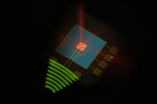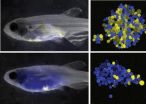(Press-News.org) PROVIDENCE, R.I. [Brown University] — Much of the research on post-combat mental health of veterans focuses on problems like post-traumatic stress disorder (PTSD) and major depression. A paper co-authored by R. Tyson Smith, visiting assistant professor of sociology, takes an even broader snapshot of returning soldiers' mental state by focusing instead on the identity conflict many face when transitioning from soldier to civilian life and how that conflict manifests as mental distress. The paper was published in the January issue of Society and Mental Health.
"You can't really do research on veterans mental health without some kind of dialogue on PTSD, but we're trying to move away from the standard PTSD framework to contextualize the veteran experience and get a more accurate picture of what vets returning from war look like as opposed to just looking at the medical side of things," Smith said.
To get this picture, Smith and co-author Gala True, from the Center for Health Equity Research and Promotion in Philadelphia, conducted lengthy interviews with 26 veterans who had recently served in Operation Iraqi Freedom (OIF) and Operation Enduring Freedom (OEF). Twelve of the interviews were done with veterans who were not routinely receiving health care through the Department of Veterans Affairs (VA) and 14 of the interviews were done with veterans who were.
Both Smith and True used a semi-structured interview style consisting of non-directive, open-ended questions such as "Tell me about your experience while deployed," "Whom, if anyone, do you speak to about your war experiences?" and "What, if any, issues have you been dealing with since your return?" Interviews typically lasted several hours and were recorded. The veterans interviewed represented all four branches of the military and all had been deployed at least once in OIF or OEF.
Analyzing the veterans' reported experiences following the interviews, Smith and True note than many of them had commonalities to their stories, in particular the sense that their combat experience was something that few could understand and that they felt "alien" among family and friends.
Confounding the issue, the authors point out, is the fact that the current wars are much less visible than previous wars like Vietnam, where many Americans knew someone who served. Many of today's soldiers refer to themselves as the "less-than-one-percent."
"Within our culture, there's this dichotomy of the valorous hero on one side and the battered, hair-trigger vet on the other. And the true experience is often not at those extremes and leaves veterans feeling if not judged, misunderstood," Smith said.
Many of the soldiers Smith and True interviewed also spoke of combat as a time when they felt "safe," even more so than when returning to the United States. The military, the authors point out, is a highly regimented institution where soldiers develop identities that give them a sense of order, obedience, and collectivism. When they return home, "behavior is suddenly voluntary and the lack of regimentation (and a larger sense of purpose) is a basis of distress," they write.
Smith said that many soldiers have difficulty creating an identity when they return to civilian life.
"You're making sense of who you are again and that's a process that we all do in life on a regular basis, but in this case you return and it's distressing trying to make sense of yourself after this combat experience. Within the total institution of the military, while there are threats and harms, it was also profoundly shaping who you were and your sense of self. That order and identity is no longer part of the everyday after exiting the service."
The veterans that Smith and True interviewed reported feeling like they were starting all over again when they returned home, while others felt distanced from their civilian relationships, afraid to disclose too much about their combat experience for fear of being judged or misunderstood. The authors point out that withholding such information can stunt a veteran's ability to reintegrate into civilian life by straining those relationships with people who would be their primary support systems.
These "warring identities" can act as a catalyst for or even present as mental health behavioral problems, according to the paper. Smith and True argue that more attention needs to be given to this psychological process as it plays out when soldiers return from war and to broadening the framework surrounding soldiers' mental health issues beyond diagnosable illnesses such as PTSD and depression.
Smith said that while expansion of social support programs is always needed, expansion of dialogue around the veteran experience would be a good first step.
"I think that one of the larger scale issues is that we have a lot of difficulty talking about the realities of war. There's a lot that can be done to enhance the understanding and conversation around what are definitely difficult topics. Seeing, handling, coping with dismembered children is hard to think about for all of us, and we really want to turn a blind eye to it. But turning that blind eye is part of the continued struggle."
INFORMATION: END
Returning vets face 'warring identities' distress
2014-03-06
ELSE PRESS RELEASES FROM THIS DATE:
Colored diamonds are a superconductor's best friend
2014-03-06
Flawed but colorful diamonds are among the most sensitive detectors of magnetic fields known today, allowing physicists to explore the minuscule magnetic fields in metals, exotic materials and even human tissue.
University of California, Berkeley, physicist Dmitry Budker and his colleagues at Ben-Gurion University of the Negev in Israel and UCLA have now shown that these diamond sensors can measure the tiny magnetic fields in high-temperature superconductors, providing a new tool to probe these much ballyhooed but poorly understood materials.
"Diamond sensors will give ...
Alzheimer's research team employs stem cells to understand disease processes and study new treatment
2014-03-06
Boston, MA – A team of Alzheimer's disease (AD) researchers at Brigham and Women's Hospital (BWH) has been able to study the underlying causes of AD and develop assays to test newer approaches to treatment by using stem cells derived from related family members with a genetic predisposition to (AD).
"In the past, research of human cells impacted by AD has been largely limited to postmortem tissue samples from patients who have already succumbed to the disease," said Dr. Tracy L. Young-Pearse, corresponding author of the study recently published in Human Molecular Genetics ...
E-cigarettes: Gateway to nicotine addiction for US teens, says UCSF study
2014-03-06
E-cigarettes, promoted as a way to quit regular cigarettes, may actually be a new route to conventional smoking and nicotine addiction for teenagers, according to a new UC San Francisco study.
In the first analysis of the relationship between e-cigarette use and smoking among adolescents in the United States, UCSF researchers found that adolescents who used the devices were more likely to smoke cigarettes and less likely to quit smoking. The study of nearly 40,000 youth around the country also found that e-cigarette use among middle and high school students doubled between ...
Up-converted radio
2014-03-06
Ever worry about losing your mobile-phone reception? The problem is a weak microwave signal. The same problem hampers cosmologists looking at the early universe, a glimpse embodied in the cosmic microwave background. Or take a pressing earthly example: oncologists often locate and identify tumors using MRI scans. All three of these efforts---communications, cosmology, medicine---depend on discriminating weak microwave or radio signals from a noisy environment. A new approach to this important problem provides a clean, all-optical detection of microwaves and radiowaves ...
Discovery sheds new light on marijuana's anxiety relief effects
2014-03-06
An international group led by Vanderbilt University researchers has found cannabinoid receptors, through which marijuana exerts its effects, in a key emotional hub in the brain involved in regulating anxiety and the flight-or-fight response.
This is the first time cannabinoid receptors have been identified in the central nucleus of the amygdala in a mouse model, they report in the current issue of the journal Neuron.
The discovery may help explain why marijuana users say they take the drug mainly to reduce anxiety, said Sachin Patel, M.D., Ph.D., the paper's senior ...
Some people really just don't like music
2014-03-06
It is often said that music is a universal language. However, a new report in the Cell Press journal Current Biology on March 6 finds that music doesn't speak to everyone. There are people who are perfectly able to experience pleasure in other ways who simply don't get music in the way the rest of us do.
The researchers refer to this newly described condition as specific musical anhedonia—in other words, the specific inability to experience pleasure from music.
"The identification of these individuals could be very important to understanding the neural basis of music—that ...
'Seeing' bodies with sound (no sight required)
2014-03-06
People born unable to see are readily capable of learning to perceive the shape of the human body through soundscapes that translate images into sound, according to researchers who report their findings in the Cell Press journal Current Biology on March 6. With a little training, soundscapes representing the outlines and silhouettes of bodies cause the brain's visual cortex—and specifically an area dedicated in normally sighted people to processing body shapes—to light up with activity.
With no more than 70 hours of training on average, study participants could recognize ...
Common mutation is culprit in acute leukemia relapse
2014-03-06
Harvard stem cell scientists have identified a mutation in human cases of acute lymphoblastic leukemia that likely drives relapse. The research, published in Cancer Cell, could translate into improved patient care strategies for this particular blood cancer, which typically affects children but is more deadly in adults.
In recent years, a trend toward single-cell analysis has shown that individual cells within a tumor are capable of amassing mutations to make them more aggressive and treatment resistant. So while 99% of a tumor may be destroyed by the initial treatment, ...
Warming temperatures are pushing 2 chickadee species -- and their hybrids -- northward
2014-03-06
The zone of overlap between two popular, closely related backyard birds is moving northward at a rate that matches warming winter temperatures, according to a study by researchers from the Cornell Lab of Ornithology, Villanova University, and Cornell University. The research will be published online in Current Biology on Thursday, March 6, 2014.
In a narrow strip that runs across the eastern U.S., Carolina Chickadees from the south meet and interbreed with Black-capped Chickadees from the north. The new study finds that this hybrid zone has moved northward at a rate ...
Obese adolescents not getting enough sleep?
2014-03-06
Cincinnati, OH, March 6, 2014 -- Lack of sleep and obesity have been associated with an increased risk of cardiovascular and metabolic diseases in adults and young children. However, the association is not as clear in adolescents, an age group that is known to lack adequate sleep and have an overweight and obesity prevalence rate of 30% in the US. In a new study scheduled for publication in The Journal of Pediatrics, researchers found that cardiometabolic risk in obese adolescents may be predicted by typical sleep patterns.
Heidi B. IglayReger, PhD, and colleagues from ...



